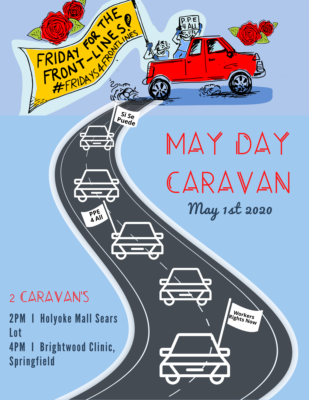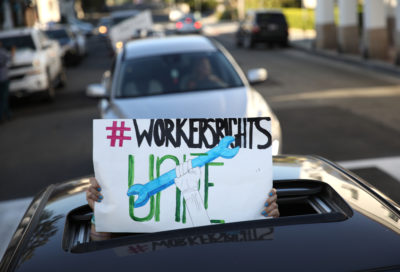By the National Committee of Solidarity
Posted May 8, 2020
AS THE ECONOMIC and coronavirus crises reveals in brutal form the sharp contours of capitalist exploitation and inequality everywhere, working people have responded by reaching out to each other and forging bounds of mutual aid and solidarity.
This May 1 both the intensity of the attack on workers, and incipient resistance have been highlighted — at Amazon, Whole Foods, Walmart, FedEx, Target and Instacart, among frontline hospital workers and the heavily immigrant and people of color work forces at meat processing plants. Even at places like the Smithfield pork plant in South Dakota lacking the most basic protection for their workers, even in facilities where hundreds of workers have tested positive for COVID-19 and dozens have died, meat processing facilities are deemed “essential” and ordered to remain open by Trump’s presidential dictate.
Senate majority leader Mitch McConnell proposes that states declare bankruptcy – so state governments can (or might be forced to) ditch state workers’ pensions and union contracts, public education obligations and basic services. Senate Republicans are committed to legislating corporate “immunity” from negligence lawsuits over deaths from coronavirus, giving companies a license to kill their workers.
Around the country, spearheaded by informal job actions at Amazon, walkouts, rent strikes and car caravans in support of workers, prisoners and immigrants detained in horrific conditions marked the day, and that’s just the beginning. An on-the-ground report from Ann Arbor, Michigan is representative of activities around the country:
“Ann Arbor saw quite a bit of activity last Friday on May Day! Movimiento Cosecha had an estimated 100 (!) cars in their caravan between Ann Arbor and Ypsi, receiving some coverage from MLive and the Michigan Daily. A number of university students were out on the streets taking graduation photos (or selfies with the caravan). Quite a few onlookers and cars in Ann Arbor expressed their support by giving us thumbs up, fist pumps, peace signs, and waving.

“Additionally, ‘A2 After Bernie’ held a caravan outside Whole Foods and the USPS office for grocery store and postal workers. We passed by it on our way back but hadn’t known about it in advance. The very nascent, newly-reborn Ann Arbor Tenants Union (No Rent Michigan) held a Teach-In together with Detroit Renter City, which had 20+ participants.
“And our Huron Valley Labor & Community COVID-19 coalition held our first virtual Town Hall, featuring nurse union activist Anne Jackson, along with an immigrant worker, tenant organizer, and mutual aid organizers. Despite technical glitches, we were very happy that figured out how to use Zoom to simultaneously broadcast it live on the Facebook pages of GEO, Huron Valley DSA, We the People MI, Science for the People (Ann Arbor), and the WACWA Baristas!”
Crucial issues in these fights include employees’ demands for compensation for unpaid time off for work, hazard pay, personal protective equipment and cleaning supplies. There are also rent strikes by people who have lost their jobs, and by others in solidarity. These struggles will expand, because both the public health emergency and the deep economic downturn are likely to be protracted.
With the Big Three eager to resume production, Autoworkers Caravan posted a petition on their Facebook page, outlining what would be necessary for workers to safely return to work. Within ten days, over 1500 autoworkers signed the AWC appeal.

On May Day, AWC organized a car caravan from Detroit to Grand Rapids with signs on workers’ safety, expressing solidarity with a UAW Committeererson fired for warning co-workers about the threat of the virus in their plant. The caravan went by the plant, displaying their signs and honking.
Graduate students at the University of California, struggling for a cost-of-living adjustment, organized car and bike caravans demanding to “bail out the working class” and supporting prisoners and immigrants. These actions took place in Santa Cruz, Berkeley, Davis, Irvine, Los Angeles and Santa Barbara. See also UC Graduate Student Workers Wildcat Strike.
The crisis has forced public recognition of the essential role of the poorly paid, low status workers who assure our basic necessities from food supplies to medical care. That recognition should include a living wage as well as the respect and power commensurate with the role of labor in assuring social needs.
Since it was founded as a workers’ holiday in 1886, International workers day demonstrations on May 1 have celebrated worker solidarity across borders and all divisions that divide working people. Never before has the idea of international worker solidarity had more power. Everywhere, workers and the oppressed are bearing the brunt of the health crises and experiencing the worst effects of the economic crisis. International supply chains in commodity production and distribution, which so much of the world relies on, depend on the labor of workers throughout the world and make international cooperation a matter of life and death.
This year May Day saw humanity facing a crisis of civilization and existence — of environmental disaster, made infinitely worse by years of cuts to health care systems, including some of the world’s most advanced, and the contradictions of the capitalist economy that was heading for trouble before the virus emerged. All this was made worse by politicians who put the interests of their capitalist masters first and public health last.
Workers in the USA are facing massive unemployment that could reach 30%, levels beyond that of the great depression of the 1930s. Small business owners, often employers of workers in industries such as hospitality and other service industries have seen public monies snatched up by bigger chains forcing them to close and throwing their workers into unemployment.
Workers in low paid jobs and the unemployed, communities of color, who have been hit at double and triple rates are experiencing the worst fallout of the crisis including food insecurity. The twin crises have magnified the oppression that women experience in the world of work, domestic life, and the public arena of social policy.
Huge parts of the Global South are headed for disaster from the coronavirus as patterns of global exploitation and inequality, formed over centuries, result in populations weakened by malnutrition and grossly inadequate public health systems. A damaged planet and a population increasingly divided into haves and have nots can simply no longer continue with the present system. It is becoming clearer every day that capitalism has failed humanity at all levels. Now more than ever, socialism is a matter of life or death for our planet and its peoples.
